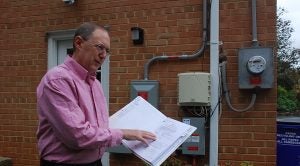New bill would boost New Jersey market for solar


The New Jersey legislature has fused together two pieces of energy legislation left on the table from its last session into a new omnibus bill. The bill, S-877, combines measures designed to stabilize New Jersey’s solar market with a bill that would subsidize several nuclear plants across the state. The solar bill passed through the legislature last session, but out-going Governor Christie pocket vetoed the bill on his last day in office. The nuclear subsidy bill was never passed out of the legislature. The solar side of the legislation lays out two concrete steps to boosting solar in New Jersey and a less-well defined measure to expand access to solar.
Increasing New Jersey’s Renewable Portfolio Standard
S-877 would raise New Jersey’s Renewable Portfolio Standard (RPS) to require that more solar energy is generated in the state. New Jersey’s current solar energy target goal is to generate 4.1 percent of the electricity we use to be from solar by 2028. The Board of Public Utilities (BPU), the agency that regulates utilities, says New Jersey is on course to meet the 4.1 percent target in the middle of this year. That New Jersey has met its solar benchmark a full decade early demonstrates how well solar works in New Jersey. The bill would increase the state’s target to 5.3 percent.
New Jersey’s RPS requires utilities generate a target percentage of their electricity from solar sources. Utilities can comply with this in two ways. They can generate solar energy themselves. Or, they can purchase solar renewable energy credits (SRECs). Owners of solar systems, small and large, generate SRECs based upon their system’s production. They can then sell these SRECs to utilities. The market for SRECs has been a key driver in the growth of the state’s solar market. Raising our solar energy generation target through the RPS ensures that the value for these SRECs remains high enough to continue to help people go solar. If utilities no longer have a higher target to meet, they will no longer have a need to buy SRECs. The value of those SRECs would drop to zero.
New Jersey’s thriving SREC market provides homeowners an opportunity for a faster rate-of-return on their upfront solar investment, especially as compared to other states. The average SREC price hovers around $200 per SREC in New Jersey. The average residential solar system in New Jersey will produce about six SRECs per year, generating more than $1,000 in annual SREC income. The omnibus energy bill will provide stability in the SREC marketplace for the foreseeable future, but not unless the current 4.1 percent solar energy market threshold is increased. The legislation includes a cessation of the SREC market once the 5.3 percent target is reached or by June of 2021.
Raising the net metering cap

The bill includes another important solar provision. It increases the net metering cap to 5.8 percent of a utility’s total annual sales. Net metering is the system used to compensate solar homeowners for the electricity they generate. Net metering provides a one-to-one credit for that electricity. Thanks to net metering, solar owners are able to offset their electric bills with every unit of solar electricity they produce, reducing their electric bills. Under current law, utilities could stop allowing net metering once solar energy accounted for 2.9 percent of their electricity sales. Raising the net metering “cap” to 5.8 percent is an important safeguard that will ensure solar customers receive a fair value for the electricity they generate.
Increasing the RPS and the net metering cap are two important concrete steps that will strengthen solar in New Jersey. The legislation also includes a third provision to expand solar via the establishment of community solar, but is less explicit on how it would be carried out.
Launching community solar
Community solar enables people to own or otherwise benefit from solar generation that is not installed on their homes. Community solar allows people whose roofs are not good candidates for solar or who rent their home to invest in off-site solar and receive monthly bill credits for the solar electricity produced.
Currently, S-877 gives wide latitude to the BPU in the creation of Community Solar in New Jersey. Many details about the community solar program remain vague. Supporters of the bill indicate that the community solar provision may be amended to simply authorize a pilot project (as opposed to a full blown program). The pilot project would be capped initially at 50 MW.
The Senate Budget and Appropriations Committee will hold a hearing February 5 to discuss the bill where it is likely to make changes to the bill. Join the Solar United Neighbors newsletter to stay informed of bill progress and to learn about how it will impact your ability to go solar.
